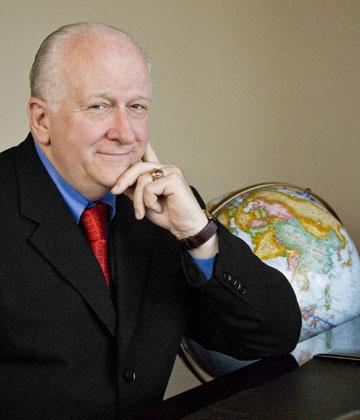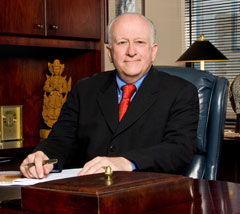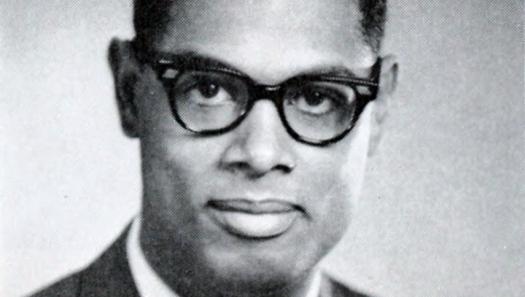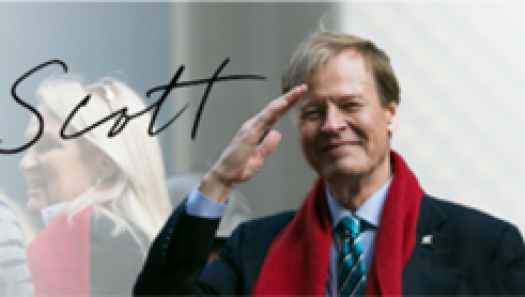WeSalute Awards
TopVet: Edwin D. Fuller

“You can’t always get what you want, but if you try sometimes, you just might find, you get what you need.”
Those lyrics from the Rolling Stones’ 60’s ballad capture Vietnam Army Veteran Edwin “Ed” Fuller’s early professional experience. His dream was to pursue a career in the airline industry and he was well on his way when unexpectedly, two job offers did not materialize. Disappointed, but not disheartened, he garnered a job offer from Marriott, a fledgling chain of 22 hotels in 1972. Over the next 38 years, bolstered by his military experience, Fuller has helped grow Marriott into the global hospitality leader with over 3,500 hotels.
For Fuller, president of Marriott’s expansive international operations, the sense of confidence and mastery he achieved from mission-critical planning and logistics in wartime Vietnam gave him the startup wherewithal to affect major change at Marriott under the leadership of fellow Veteran and CEO J.W. Marriott. From 16 hotels outside the U.S. and Canada and a staff of three, Marriott has today 360 international properties, and another 175 under construction, bringing in over $6 billion in international revenue alone.
“That’s the benefit of Marriott. He [J.W. Marriott] always stretched us a little and always gave us the opportunity,” Fuller said in an exclusive interview with Veterans Advantage. “I’ve known the man for a long, long time, and in my capacity we’ve seen a lot. He’s a great businessman, and an exceptional person.”
At the start, ironically, goals were different. Fuller, a Boston University ROTC graduate, packed his bags for Ft. Eustis and a transportation assignment holding two job offers from United Airlines and American Airlines. His hope was that his military background would further help his career in the airline industry once he returned to civilian life. After a stop in Germany and a Bronze Star tour in Vietnam, Fuller found himself equipped to handle almost anything.
“I got opportunities to deal with problems and logistics that were beyond my belief at the time. And it gave me great confidence to work at an organization of that size and be able to make changes, which was very beneficial for me,” he said.
is constantly on my mind, and
makes a huge impact on
how I make decisions and how
I feel about
“It just wasn’t that intimidating to me. If I could work my way around the U.S. Army, I could certainly have a run at smaller organizations.”
Unfortunately, hard economic times in the U.S. after Fuller’s Vietnam discharge were an unexpected setback, and both job offers fell through. A friend suggested Marriott as another way to get into the airline industry, through its in-flight catering division. Subsequently, however, a sales position filling hotel rooms with military personnel in the DC area quickly became more appealing and Fuller’s career took off. Soon he was entrusted with operational assignments, opening new properties in the U.S., most notably large launches in Long Island, NY, and the 1,500-room Copley Place Marriott in Boston. He was then promoted to take the helm of regional management positions across America as Marriott gained momentum: 100 properties by 1981 to 600 by 1990. J.W. Marriott always viewed growth, especially during tough economic times, as an opportunity during those days, and Fuller dutifully agreed.
FOUNDATION FOR SUCCESS
Fuller’s business sense was fueled by his earlier years. The son of an Army captain, Fuller took time off after two years at Wake Forrest University to identify his goals for the future. He eventually found his way back to Boston University, where extracurricular activities, including being the business manager of the school paper, inspired him for an executive lifestyle where relationship building was a key differentiator.
Adolescent life in Boston, politically during Vietnam, was a challenge for someone like Fuller. ROTC cadets in the area were encouraged to wear suits instead of uniforms, placing an extra challenge on an aspiring executive who made getting along with others a priority, but not one that prevented him from achieving. “Internationally, a lot of business is done through relationships, not as strong a factor in the U.S., but an advantage if you are comfortable in relationships.” Fuller reflects on the attraction he developed for international business. “I enjoyed the pace and enjoyed the activities. It was a fun part of growing up.” After graduating from Boston University, Fuller’s first overseas deployment took him to Germany, supervising airlift support. There he took advantage of an opportunity to fill a full colonel’s position to excel at the extra responsibilities of reorganizing operations on the ground. In 1970, he was off to Vietnam, where he worked for the military assistance command (MACV), and was awarded a Bronze Star.
HOSPITALITY FOR ALL
Now fast forward to Marriott’s hypergrowth and Fuller’s role being in the center of it. Launching an international operation is no easy matter, especially in the hospitality business. Fuller travels close to a half million miles per year, but the benefits are fulfilling. It has
also presented some ironies for this Vietnam Vet, who now travels back to do business at Marriott’s seven properties in Vietnam. “I have spent an awful lot of time in Vietnam since the 70’s, and it’s good to see stability come back to the country,” says Fuller, who was recently surprised to bump into a fraternity brother (and fellow Vet) in Saigon who was replacing a Navy Commander on emergency leave.
Marriott operates peacefully in areas where many businesses hesitate to venture: Most of the Middle Eastern countries, including Pakistan and Libya. “I don’t see our business as political. I see our business as hospitality. And that breaks down borders,” he notes. At the personal request of General David Petraeus to CEO J.W. Marriott, Fuller traveled to Iraq to start sizing the potential for bringing Marriott there. “Not yet, but hopefully one day,” he notes.
The Iraq journey was particularly memorable. Fuller remembered how comfortable he felt wearing the gear, and being surrounded by fellow soldiers. “The military is constantly on my mind, and makes a huge impact on how I make decisions and how I feel about my job,” he said.
It’s that pride of service that fuels a desire to constantly seek improvements, and one that has defined Fuller’s career – ultimately keeping Marriott ahead of the curve as it continues to pioneer international growth.
INDUSTRY ACHIEVEMENTS
An active alumnus of Boston University, Mr. Fuller is a former president of BU’s Alumni Association and a former trustee of the University. He currently serves on the advisory boards of its hotel and business schools, where he is Chairman of the Hospitality Board. He also serves on the University’s International Advisory Board. In 1998, he received the Alumni Award, the University’s highest recognition. He recently was appointed to the Board of Overseers of Boston University. He also serves as Chairman of the Advisory Board for the University of California, Irvine, the Paul Merage School of Business, and was recently appointed to the California State University Hospitality Industry Advisory Board. He is a Trustee of the International Business Leaders Forum, chairs the Governing Council of the International Tourism Partnership, and currently serves on the Safe Kids Worldwide Board and the Pacific Area Travel Association Foundation Board, as well as the Editorial Advisory Boards of TravelAge West and GlobalHotelNetwork.com. Earlier this year, he was named a commissioner of travel and tourism for the State of California. He is a past member of the Corporate Advisory Board of Safe Kids Worldwide and a former Director of the United Way International Board. He also received the China Hotel Investment Summit 2008 Lifetime Achievement Award.





